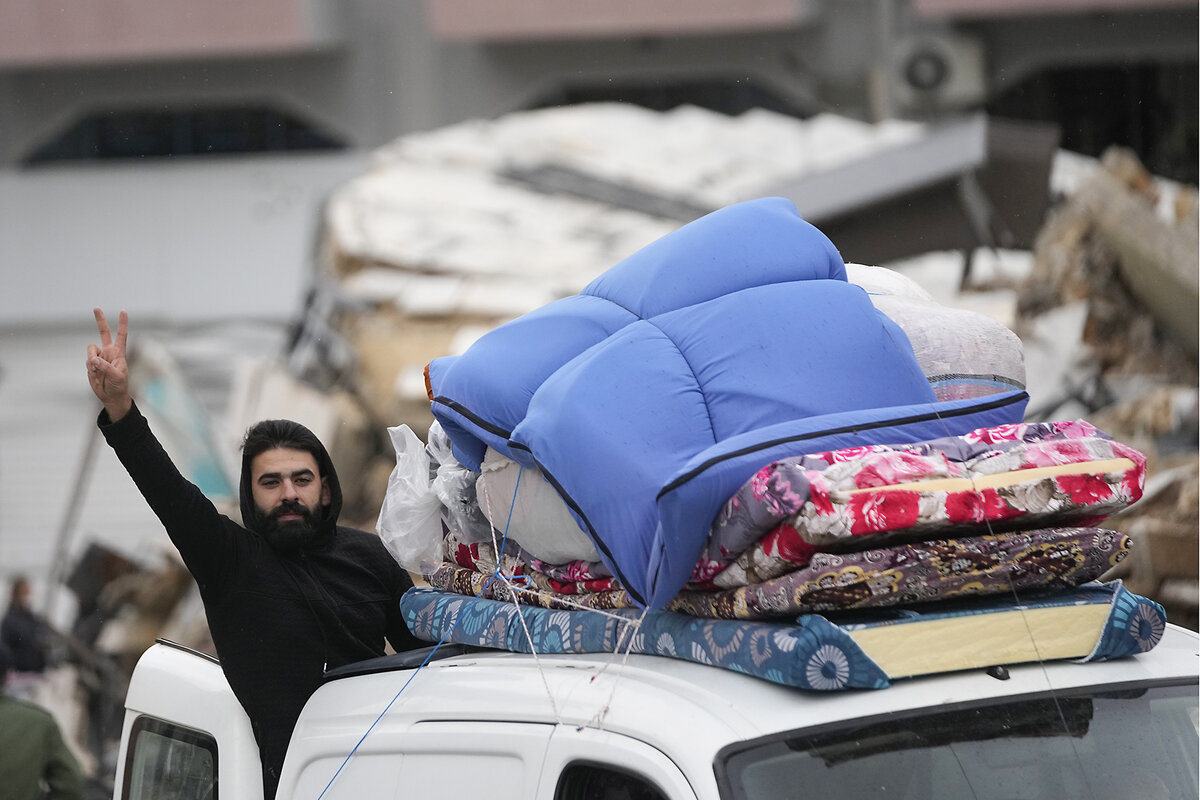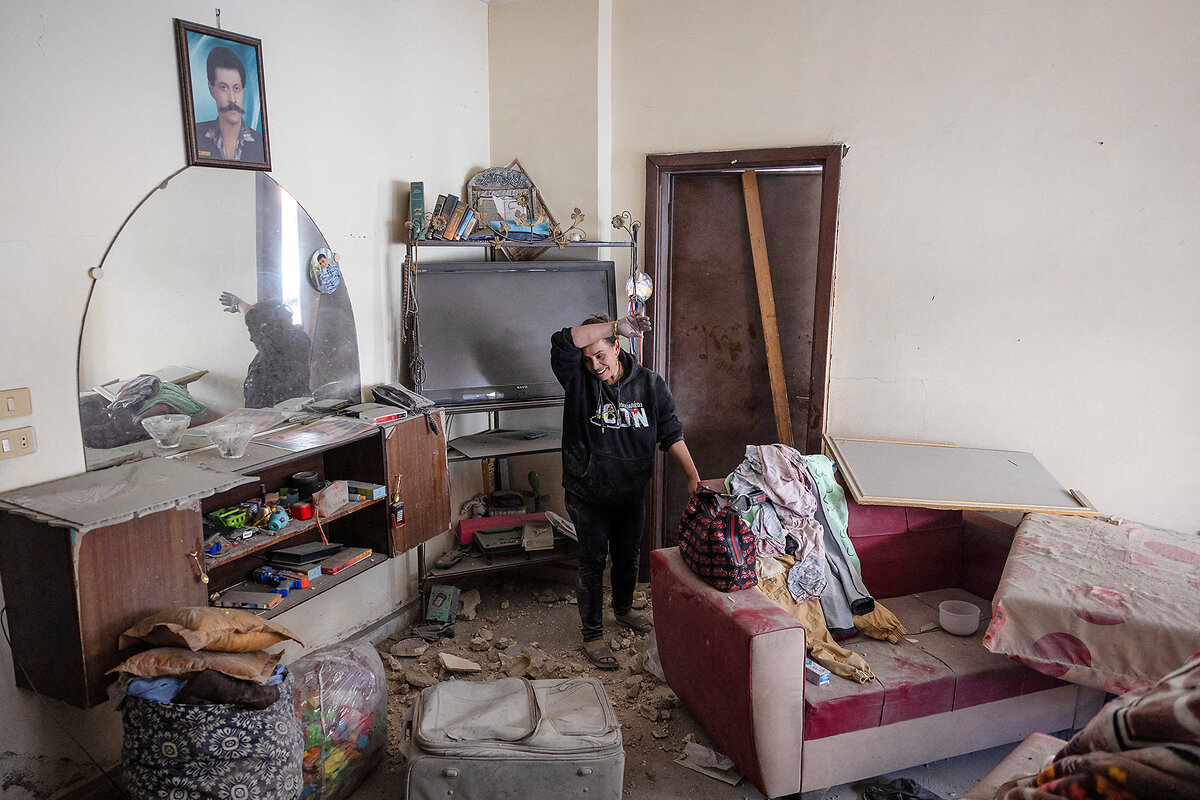Israel enjoys upper hand as ceasefire signals Hezbollah’s limits
Loading...
| London; and Tel Aviv, Israel
A ceasefire came into force in Lebanon before dawn on Wednesday, as Israel and the Shiite militia Hezbollah laid down their arms, after more than a year of hostilities.
The U.S.-brokered 60-day truce prompted thousands of Lebanese to clog southbound roads toward the areas hit heaviest by the fighting, as they returned to what remained of their homes.
Why We Wrote This
Hezbollah has emerged from its 13-month war with Israel leaderless and weak, no longer the powerful regional force that Iran has depended on. Will Israel seek to take advantage of Tehran’s new vulnerability?
Under the terms of the ceasefire, Hezbollah troops must pull back behind the Litani River, which runs about 30 kilometers (18 miles) north of the border, and Israeli forces must withdraw fully from southern Lebanon.
A reported side deal allows them to strike at Hezbollah, however, in consultation with Washington, if Israel detects a violation of the ceasefire terms.
The war has devastated Lebanon – over 138,000 people died, and Israeli airstrikes destroyed swaths of Beirut – and Hezbollah is reeling from the loss of its top echelon of leaders. Once the strongest element in Iran’s array of regional allies, it has lost much of its deterrent power.
That leaves Iran weaker, and Israeli Prime Minister Benjamin Netanyahu boasting that his country is “changing the face of the Middle East.” The question now is whether that ambition will embolden him to attack Iran directly.
Before dawn on Wednesday, Israeli and Hezbollah militia guns fell silent as a U.S.-brokered ceasefire took hold, capping more than 13 months of escalating conflict that has devastated parts of Lebanon and emptied communities on either side of the Israel-Lebanon border.
Celebrations erupted in Lebanon as the 60-day truce took hold. By daybreak, roads heading south to the area hit heaviest by the fighting were clogged with thousands of cars as Lebanese residents returned to what was left of their homes.
On the other side of the border, Israelis were more skeptical. Few of the 60,000 people who had been evacuated from their homes in the face of Hezbollah shelling and missile fire seemed convinced that it was safe to go home. The Israeli army, however, emerged from the war with significant gains.
Why We Wrote This
Hezbollah has emerged from its 13-month war with Israel leaderless and weak, no longer the powerful regional force that Iran has depended on. Will Israel seek to take advantage of Tehran’s new vulnerability?
Israel battered Hezbollah – the strongest of Iran’s regional allies – demonstrating deep intelligence penetration and military prowess. It assassinated the top echelons of Hezbollah’s leadership, destroyed Hezbollah tunnel systems along the border, and claims to have destroyed the bulk of Hezbollah’s arsenal of 150,000 rockets and missiles.
President Joe Biden announced the ceasefire, saying that it is “designed to be a permanent cessation of hostilities,” and that “what is left of Hezbollah” would “not be allowed to threaten the security of Israel again.”
Israel can still attack
The deal requires Hezbollah to withdraw north of Lebanon’s Litani River, about 30 kilometers (18 miles) from the border, and for Israeli forces to withdraw fully from southern Lebanon. Some 5,000 Lebanese army troops, alongside United Nations peacekeepers already on the ground, will monitor the ceasefire.
A reported side agreement allows Israel to strike Hezbollah, in consultation with Washington, if it detects violations of the ceasefire terms. Israel will have to be “very tough” and “disproportionate” in preventing the Shiite militia from rearming and reorganizing near the border, said Yaakov Amidor, a retired general and former national security adviser, during a briefing with reporters.
“After Oct. 7, we learned the lesson,” he said. “We don’t let the other side grow and get stronger.”
Israeli Prime Minister Benjamin Netanyahu said that Hezbollah had been degraded, and was “no longer” the organization that attacked Israel on Oct. 8, 2023, in support of Hamas, which had launched its lethal raid on Israel the day before.
He gave three reasons for the ceasefire: to allow Israel to focus on the “Iran threat”; to give the Israeli military time to regroup after fighting on two fronts; and to isolate Hamas. Hezbollah was obliged to drop its insistence on a ceasefire in Gaza in return for laying down its arms.
The price has been high for Lebanon, where authorities say that more than 3,800 people have been killed – mostly in Israeli bombing raids – and reconstruction costs will be monumental. Hezbollah’s reputation in the country has suffered; many Lebanese, including the militia’s Shiite supporters, are angry at the scale of destruction of a war that many saw as unnecessary.
“It’s critically important that Hezbollah looks after the social welfare needs of their constituents,” says Nicholas Blanford, a Hezbollah expert in Beirut with the Atlantic Council. “That, to my mind, would be a more pressing matter than thinking about rearming.” Already, he says, Hezbollah has made surveys of destruction in Beirut’s southern suburbs, and even issued construction contracts. Providing for people as winter comes will be a key test.
“If these folks are still living in tents on the rubble of their homes in a year’s time, their anger is going to be directed more toward Hezbollah – and Hezbollah can’t afford to have that,” adds Mr. Blanford, author of “Warriors of God: Inside Hezbollah’s Thirty-Year Struggle Against Israel.”
Will Iran be the next Israeli target?
Both sides indulged in a frenzy of violence just before the truce came into force. Israel unleashed some of the heaviest airstrikes of war on Beirut and Hezbollah strongholds in southern and eastern Lebanon, and Hezbollah showed that, however degraded, it could still launch upward of 340 rockets into central Israel in a single day, as it did on Sunday.
But as the war’s dust settles, Israel has wrought fundamental change in the Middle Eastern balance of power.
“This conflict has eroded Iran’s deterrence,” says Mr. Blanford, noting that “mutual deterrence” between Hezbollah and Israel held for 17 years, the longest period of calm on the border since the mid-1960s.
“But the Israelis ended up calling Hezbollah’s and Iran’s bluff,” calculating that Tehran did not want a broader war, he says. What followed was a surge of airstrikes; an attack involving exploding pagers and walkie-talkies, which wounded thousands of Hezbollah fighters; and a wave of assassinations that included Hezbollah’s revered chief Hassan Nasrallah.
“This is going to be a big problem for Iran, because you have a Hezbollah that has been weakened militarily,” says Mr. Blanford.
“The deterrence factor isn’t there anymore,” he adds. That might tempt Israel to attack Iran directly, he suggests. “And if they do that, and if Hezbollah does retaliate, then the Israelis are just going to smash more of Lebanon.”









